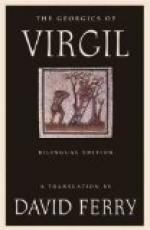|
This section contains 2,348 words (approx. 8 pages at 300 words per page) |

|
SOURCE: "Virgil: The Georgics," in God Made the Country, Alfred A. Knopf, 1946, pp. 29–36.
In the following essay, Booth views Virgil as an authority on husbandry and details the picture of agricultural life presented in the Georgics.
The greatest Roman poet—the greatest poet of antiquity, some call him—was a rustic; his most finished poem, a portrait of the Roman peasant, full-length, against a background of Italian landscape and the eternal round of farm labor. His life long Virgil could not conceal beneath his ill-fitting toga the awkwardness of the countryman; the diffidence, the candor, the sincerity of the frontiersman, the borderer. He was a tall, loose-jointed man with the weathered complexion of a farmer. Out of all the innumerable myths about him and a few surviving portraits appear features, figure, and bearing that suggest Abraham Lincoln; something of Lincoln's kindness and melancholy, if none of his humor...
|
This section contains 2,348 words (approx. 8 pages at 300 words per page) |

|


